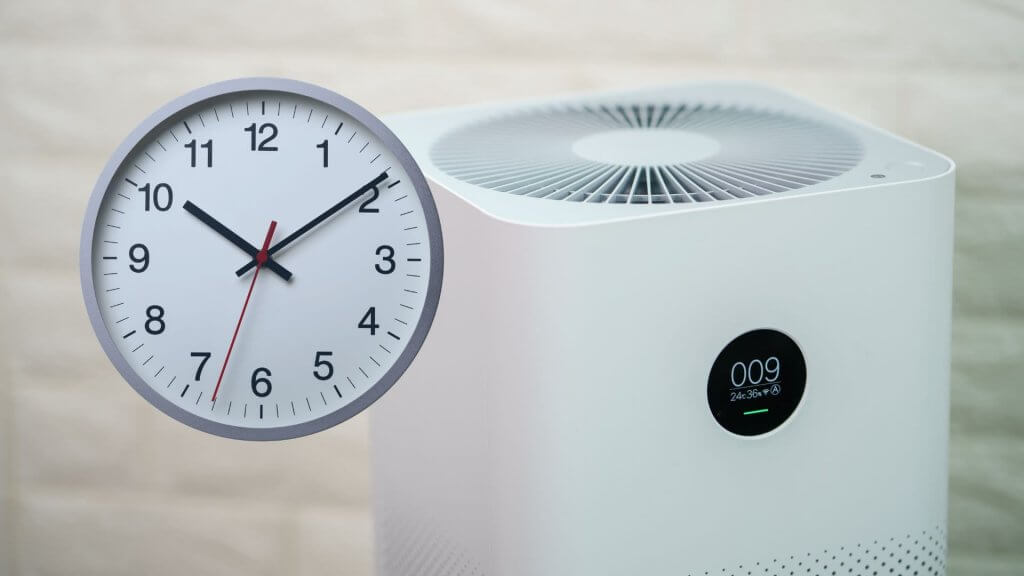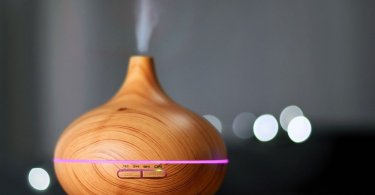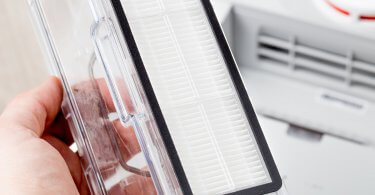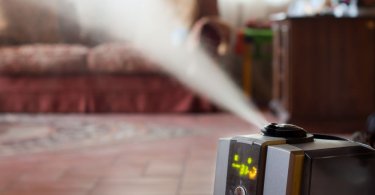You may have just brought home a new air purifier or have had one for a while but aren’t sure if you’re running it correctly. It’s tough to know how long to run the air purifier unit for optimal performance. And if you’re not running it enough, your allergies or asthma may not be getting any better.
So, how long do you need to run it for optimum results? We’ve got the answer for you. Read on to know how long to run the air purifier each day and enjoy its efficiency.

How Long Should You Run an Air Purifier?
Air purifiers are ideal for purifying indoor air quality and keeping most indoor pollutants at bay. But their run time is often a tricky question.
It is best to run an air purifier for at least 12 hours per day to remove a significant amount of airborne pollutants from your home.
However, run times may need to be increased in homes with higher levels of pollution or if someone in the household suffers from allergies or asthma.
Also, it is important to regularly change the filter on your air purifier to reap the amazing benefits of this smart device. Depending on the type of filter, you might have to change its filter every 1-3 months.
Additionally, if you have a large space to purify, you may need to run multiple air purifiers to achieve desired results.
If, despite these guidelines, you’re unclear about the air purifier’s run time, consult with the air purifier manufacturer for a sure-shot answer.
How Fast Does An Air Purifier Work?
An air purifier typically works quite quickly, especially when compared to other methods of cleaning the air in your home.
For example, a fan-based purifier can clean all the airflow in a room in just minutes, while a HEPA air purifier can take several hours to achieve the same result.
Some factors that affect how quickly an air purifier works include the type of unit, size of the air purifier unit, and the specific needs of your home.
Usually, you can expect an air purifier to start reducing airborne contaminants almost immediately after you turn it on.
If you have any specific concerns about air quality in your home (such as asthma or allergies), an air purifier with carbon filters and an air quality indicator will cover you. If you have pets or suffer from allergies, you may want to consider running your air purifier for longer periods because the carbon filter will need some extra time.
High-end air purifiers are better at improving indoor air quality because of their pre-built indicators. Say you can’t recall how long your residential air purifier has been working and if you should turn it off now.
An energy-efficient air purifier will help you on this front by showing air quality metrics and pollutant levels, something you’ll love in the long run.
Related article: How to Tell If Your Air Purifier Is Working
Factors Impacting Your Air Purifier’s Run Time
Not every home is the same, and each person has different air purification needs.
So, instead of pinpointing a general air purifier run time to improve your indoor air quality, let’s discuss primary factors impacting air purifier performance and run time.
1. Room Size
When choosing an air purifier, one of the most important factors to consider is the size of the unit. This is because the size of your room will impact the air purifier’s performance.
If the unit is too small, it won’t effectively clean the air in your room, and some airborne pollutants will always be there.
On the other hand, if the unit is too large, it will use more energy and produce more noise. Therefore, it is important to choose an air purifier that is the right size for your room.
If you have an appropriately-sized air purifier, running it for 10-12 hours a day will ensure your indoor air quality level is always good.
2. Air Extraction Rate
Your air purifier’s performance and appropriate running time are greatly impacted by the air extraction rate (the rate at which the unit pulls in and filters the air. A higher extraction rate will filter air more quickly but will also use more energy.
Therefore, the optimum extraction rate is a balance between efficiency and power consumption.
The best way to determine the optimum extraction rate for your purifier is to select a unit with an adjustable speed setting. This way, you can experiment with different settings to find the one that works best for your needs.
3. Filter Type
The type of air filter in your purifier can significantly impact its performance and the indoor air quality in your home.
High-efficiency particulate air (HEPA) filters are usually considered the best to remove airborne contaminants.
These smart filters are designed to capture at least 99.97 percent of particles with 0.3 microns in size. This means that they effectively remove even the smallest particles from the air, including dust mites, pollen, and smoke.
A HEPA filter-equipped air purifier can help improve your home’s indoor air quality and reduce allergies and respiratory problems.
Additionally, because they are so effective at trapping harmful particles, HEPA filters need to be replaced less often. Although they may cost more upfront, HEPA filters prove to be cost-saving in the long run by reducing replacement costs and improving the efficiency of your purifier.
Related article: Can You Wash a HEPA Filter?
Can You Sleep With The Air Purifier On?
If you wonder whether it is safe to sleep with an air purifier on, the answer is yes, you can sleep with your air purifier on.
In fact, many people find that their air purifier helps them sleep better. Air purifiers remove allergens, dust, and other airborne particles, making for a more comfortable sleeping environment.
Some air purifiers also emit negative ions, which can help improve your mood and alleviate stress.
If you have an air purifier with a timer, you can set it to turn off a few hours before you wake up so that you don’t have to worry about it running all night.
Ultimately, whether or not you sleep with your air purifier on is a personal decision (a light sleeper won’t want the extra noise). But if you find that it helps you breathe easier and increase the quality of your sleep, there is no reason not to use it at night.
Related articles:
Best Air Purifiers That Effectively Remove Radon Gas
Best Air Purifiers with Permanent and Washable Filters
Summing Up
Air purifiers are a great way to clean the air in your home and improve your indoor air quality. But how long should you run your air purifier?
The answer depends on a few factors, including the size of the unit, the level of pollution in your home, and the amount of time you spend indoors.
But generally, it is best to run your air purifier for at least 12 hours a day. This will give the unit time to filter out pollutants and improve the air quality in your home. If you have a large unit, you may be able to run it for less time. And if you have a small unit or live in an area with high levels of pollution, you may need to run it for more than 12 hours a day.
Lastly, no matter what, follow the air purifier manufacturer’s instructions to get the most out of your air purifier.





Leave a Comment